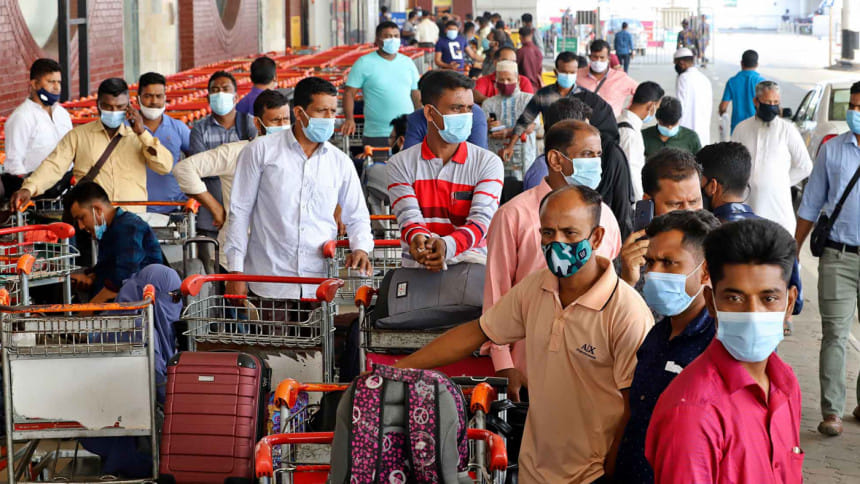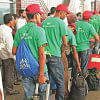Syndicates in migration: Re-accessing the Malaysian labour market

In all likelihood, May 31, 2022 will mark an important milestone in the history of labour migration governance in Bangladesh. It was on this day that groups belonging to a diverse range of sectors converged in a Dhaka hotel to form a united platform to thwart the move by a powerful quarter to jeopardise the prospect of reopening the Malaysian labour market.
The group—comprising parliamentarians, members of recruitment agencies, representatives of non-governmental organisations, migration experts, and leading members of the media—was concerned that a nexus of a few Bangladeshi recruitment agencies and a powerful segment of the human resources ministry in Malaysia are trying to impose unfair and unethical conditions on the long-awaited reopening of the Malaysian labour market. They felt that if protagonists of such a move succeeded in their efforts, it would lead to massive corruption, spiking the migration cost far beyond the threshold stipulated by the Government of Bangladesh (GoB), causing immeasurable harm to the migrants and a loss of remittance for the national exchequer. They recalled that such a monopolistic control of 10 recruitment agencies over the labour recruitment process in 2016-18 had eventually led to the suspension of the flow of migrant workers from Bangladesh to Malaysia by the new government after the fall of Najib Razak government.
The speakers congratulated the expatriates' welfare and overseas employment minister of Bangladesh for reiterating the GoB's firm stand to allow all bona fide recruitment agencies in the labour recruitment process as per the ILO conventions and the Competition Act. They, however, warned that any departure from such a principled stand by this GCM (Global Compact of Migration) champion state would amount to undermining the GoB's commitment to ethical, fair and safe recruitment at a minimal cost. Some felt that the actions of errant agencies amounted to economic sabotage of the state, and demanded exemplary punishment for those who are engaged in such activities.
The highlight of the event was the candid statement of Nur Ali, a veteran leader in the Bangladeshi recruitment industry and a member of the 2016-18 cartel. Ali narrated the negative features of syndication from his experience. He said despite clear stipulation to provide two months' advance salary and return air ticket to the workers and a service charge to the recruitment agents, such benefits never reached the workers; instead, they were made to pay several times more than the GoB-stipulated amount. The hefty amounts were pocketed by those at the helm of the syndicate. He further alleged that a Malaysian Dato of Bangladeshi origin, with access to the corridors of power in Putrajaya, and an influential Bangladeshi recruitment agent were the "passwords" of the recruitment process that resulted in a debacle causing immense hardship and misery to the workers, and the ultimate closure of the market for years. This captain of the industry noted that in no way do a cartel of a dozen or two recruitment agencies have the capacity to meet the demands of tens of thousands of workers that are needed by the Malaysian manufacturing and services sectors. He reckoned that a syndicate-based system can at best process only a fourth of the total demand of the Malaysian labour market. Ali further shared that because of the corrupt practices inherent in the syndication system, Bangladeshi workers could not be deployed in several industries, such as manufacturing and electronics, as compliance monitoring mechanisms of those industries are strict. There is no reason it will be any different this time.
At the meeting, speakers after speakers wondered why the Malaysian human resources minister insisted on limiting the engagement of Bangladeshi recruitment agents, while provisions have been kept for more than 500 registered recruitment agents of Malaysia to take part in the process, and there is no such stipulation for bringing workers from 13 other source countries to Malaysia. Citing media reports, speakers warned that there was no consensus in Malaysia about this syndicate system. The Mahathir government discontinued the system in 2018 on grounds of high level of corruption, and if the system is adopted by the current Malaysian government, there is no guarantee that it would continue when and if a new government is formed after this year's national elections. This, in turn, may lead to the closure of the market yet again, causing huge financial losses to the unsuspecting aspirant migrants making advance payments to recruitment agencies.
There is little doubt that in the past, under the syndicated system, Bangladeshi workers had to pay many times more than the stipulated amount. In other words, the workers who were fortunate enough to secure employment had to spend several months earning only to pay off the migration costs.
Although no firm figure has been slated, industry sources estimate that there is a likelihood of 1.5 to 2 million Bangladeshi workers securing employment in Malaysia over the next five years. Meeting such a high demand by a handful of agencies is a nearly impossible task. This raises the question: On what grounds is such an important and big labour market left at the mercy of 1.6 percent of the total number of registered recruitment agencies in Bangladesh? There is also the need to assess the actual capacity of the agencies that would be tasked to send workers to Malaysia. It may be noted that only a third of the 1,500 valid licence-holders have the prior experience of sending workers to Malaysia. Sending workers through a syndicated arrangement will, in all likelihood, result in Bangladesh's inability to access the sectors that are part of Malaysia's Responsible Business Alliance, a conglomeration of industries that engages workers free of cost and pays service charges to agencies that facilitate deployment, such as those in electronics, apparel manufacturing, hand gloves production, plantation and security. Can Bangladesh afford to miss accessing these important sectors?
Sending workers through a syndicated arrangement would be in breach of the Competition Act and contrary to relevant international standards that Bangladesh upholds. It would also be in contravention of the order of the Appellate Division of the Supreme Court that proscribed any move to form oligopoly for the Malaysian labour market.
Thus, the GoB should remain resolute in its commitment to promote free, fair and ethical recruitment, allowing all bona fide recruitment agencies to participate in the recruitment process for the Malaysian labour market. Such a stance would demonstrate the government's resolve in upholding the relevant international standards and national laws. It is time that, as a labour source, Bangladesh sent a signal that the country accords due priority to the legitimate interest of its workers and other stakeholders, and any arrangement that compromises that is unacceptable.
Dr CR Abrar is an academic. He is also the head of the Refugee and Migratory Movements Research Unit (RMMRU) and the chair of Bangladesh Civil Society for Migrants.

 For all latest news, follow The Daily Star's Google News channel.
For all latest news, follow The Daily Star's Google News channel. 









Comments